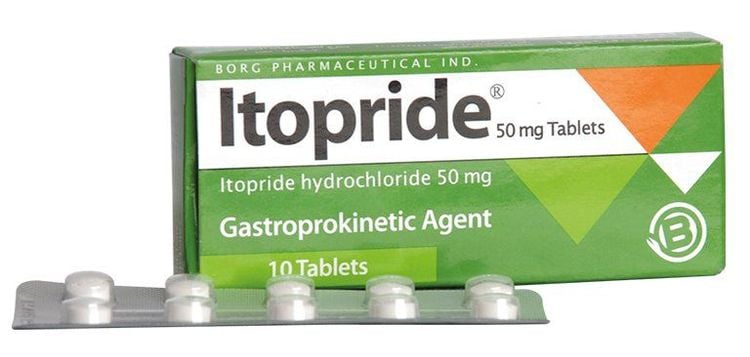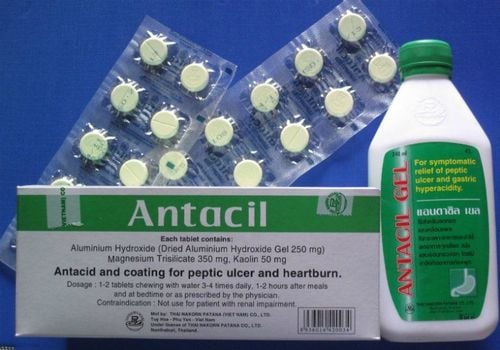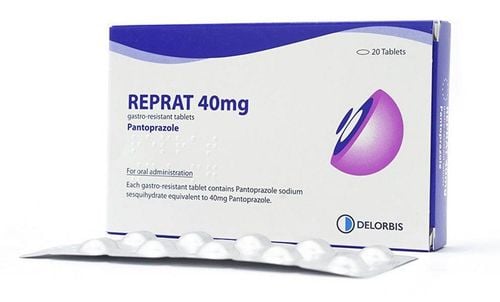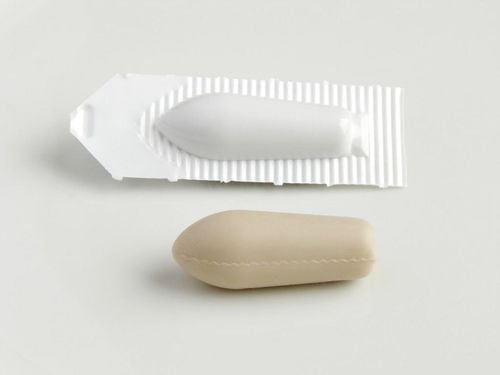Itopride 50 mg is used to treat gastroesophageal reflux, indigestion, diseases, and symptoms related to the gastrointestinal tract. Let us discover more about itopride in the article below.
1. What is itopride?
Itopride 50 mg is a prescription medication that should be used exactly as prescribed by your doctor. The major component in Itopride 50 mg is Itopride HCl, which contains 50 mg. This substance is a benzamide prokinetic derivative with a beneficial effect on the digestive system and intestines. Itopride HCl acts as a Dopamine D2 receptor antagonist . This inhibits the breakdown and release of acetylcholine.
Itopride HCl improves peristalsis in the intestines and digestive system, which speeds up stomach and esophageal emptying. This active ingredient is utilized in many medications to alleviate symptoms of upper abdominal pain, chronic gastritis, and other gastrointestinal diseases.

2. Indications for Itopride 50 mg
- Itopride is advised for the following conditions:
- Symptoms of chronic gastritis include bloating, epigastric pain, loss of appetite, heartburn, nausea, and vomiting.
- The medicine is only for adults.
3. How To Use Itopride 50 mg
- How To Use: Itopride should be taken on an empty stomach, before meals. To ensure efficacy, patients should take the medicine around an hour before their main meals. When taking the drug, swallow the entire tablet with a reasonable amount of water; do not break, bite, or chew the medicine because this can alter its structure and therapeutic effect. Use the medication as directed; even if the symptoms of the disease improve, do not discontinue use. You should consult your doctor before discontinuing the medication.
Dosage:
- Adults: The normal oral dose for adults is 150 mg of Itopride Hydrochloride (3 tablets) per day, divided into three doses of one tablet each. The dose can be decreased based on the patient's age and condition. The maximum period of use is eight weeks.
- Children: The safety and efficacy of Itopride in children have not been established.
- Patients with hepatic or renal impairment: Itopride is processed by the liver. Itopride and its metabolites are primarily eliminated through the kidneys. Patients with decreased hepatic or renal function should be closely monitored; in the event of adverse reactions, suitable measures such as dose reduction or therapy termination may be required.
- Elderly: Because physiological function in the elderly is impaired, unpleasant responses are more frequent. As a result, older individuals taking this medicine should be closely monitored, particularly those with poor liver or kidney function, concomitant illnesses, or concurrent usage with other drugs. If adverse reactions occur, appropriate interventions, such as dose reduction or withdrawal, should be implemented.
Usage: Itopride is recommended on an empty stomach, on an empty stomach, before meals. Patients should take the drug about 1 hour before the main meal to ensure its effectiveness. When taking, should swallow the same amount of water, do not break, bite or chew the medicine because it can affect the structure and therapeutic effects of the drug. Use the medicine exactly for the prescribed time, even if the symptoms of the disease improve, do not stop using the medicine. You should consult your doctor before stopping taking the medicine. Dosage: Adults: The usual oral dose for adults is 150 mg Itopride Hydrochloride (3 tablets) per day, divided into 3 times, 1 tablet each time. This dose may be reduced depending on the age and medical condition of the patient. The maximum duration of use is 8 weeks. Children: The safety and effectiveness of Itopride in children have not been established. Patients with hepatic or renal impairment: Itopride is metabolised in the liver. Itopride and its metabolites are eliminated primarily by the kidneys. Patients with reduced liver or kidney function should be carefully monitored and monitored; In the event of adverse reactions, appropriate measures such as dose reduction or discontinuation of treatment may be required. Elderly: Because of reduced physiological function in the elderly, adverse reactions are more likely to occur. Therefore, elderly patients receiving this drug should be carefully monitored, especially in patients with renal dysfunction, comorbidities, or concomitant use of other medicinal products. If any adverse reactions occur, appropriate management measures such as dose reduction or discontinuation should be used.

4.Contraindications of Itopride 50 mg
Itopride should not be used in the following cases:
- Children should not use this substance.
Hypersensitivity to any component of the medication. - Contraindicated in patients with enhanced gastrointestinal motility, such as those with gastrointestinal bleeding, mechanical intestinal blockage, or perforation.
5. Side Effects of Itopride
Itopride hydrochloride is a dopamine antagonist that can elicit extrapyramidal symptoms (often acute dystonic reactions); these are more common in children and adolescents, and at daily doses greater than 500 micrograms per kilogram.
Paralysis agitans and tardive dyskinesia occur infrequently, usually after extended treatment in elderly people, particularly women.
Other adverse effects include restlessness, somnolence, anxiety, and diarrhea. There may be hypotension, hypertension, dizziness, headache, and depression, as well as sporadic instances of blood problems, hypersensitivity reactions (rash, bronchospasm), and neuroleptic malignant syndrome.
Other adverse effects include increase of prolactin secretion, which can lead to galactorrhea or other problems. Transient elevations in plasma aldosterone levels have also been documented.
6. Notes for using itopride
- Use with caution because the medicine boosts the activity of acetylcholine.
- If gastrointestinal problems do not improve after a long period of use, discontinue use. Patients with rare inherited disorders such as galactose intolerance, Lapp lactase insufficiency, or glucose-galactose malabsorption should avoid using this medication because it includes lactose.
- Note to pregnant women: Itopride Hydrochloride's safety during pregnancy has yet to be verified. As a result, this medication should only be taken in pregnant women or women who may become pregnant if the predicted benefits outweigh the potential hazards.
Note for Breastfeeding Women: Animal (rat) studies have shown that itopride hydrochloride is excreted in milk. This medication should not be used while nursing. If required, avoid breastfeeding throughout treatment. - Keep in mind the following when driving and operating machinery: Although no effects on driving or operating machinery have been reported, the potential of decreased attentiveness cannot be ruled out because the medicine might cause tremors, headaches, dizziness, and weariness. Patients are urged to exercise caution when engaging in dangerous tasks that require alertness, such as working at heights, using machinery, or driving automobiles.
Itopride 50 mg is used to treat esophageal reflux, indigestion, gastrointestinal illnesses, and symptoms. To ensure effective therapy, patients must take the medication as prescribed or consult a doctor or pharmacist.
Please dial the HOTLINE for more information or to book an appointment HERE. Download the MyVinmec App to book appointments faster and manage your bookings easily.













